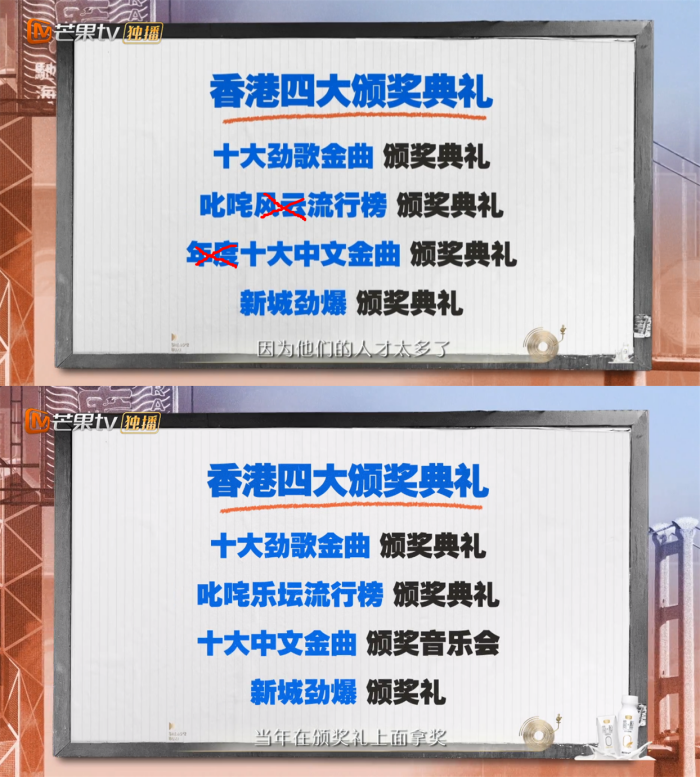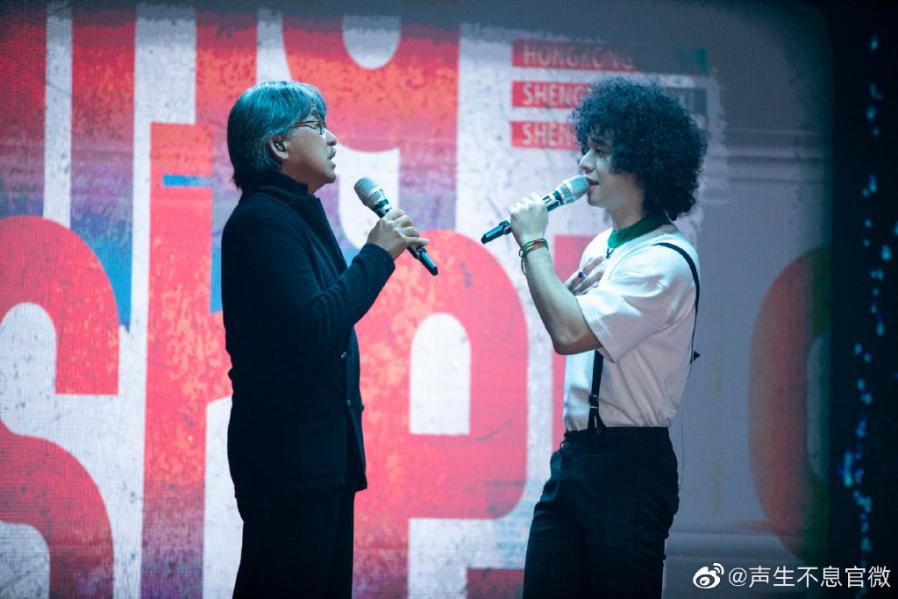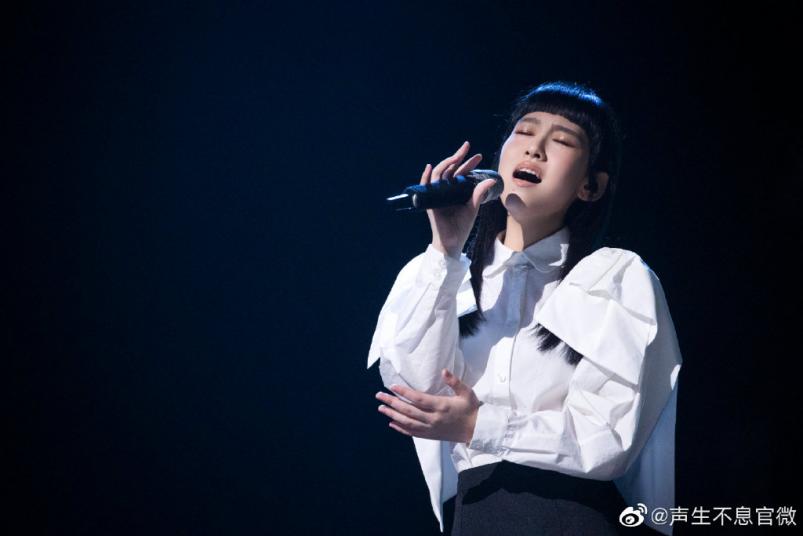The Hong Kong Philharmonic's sing-along show "Sound Endless" is the highest-level music show in the past two years. On the one hand, the show is created by the Hong Xiao team of "Singer", and Hunan Satellite TV has no rivals in the entertainment industry for the time being. On the other hand, the program's positioning is very grand. It is a variety show dedicated to the 25th anniversary of Hong Kong's return to the motherland and focusing on the development of the Greater Bay Area. It is not only broadcast on Mango TV and Hunan Satellite TV, but also on TVB's prime time every Sunday night. . 

First, let's see if the proposition is rigorous.
All the references in the program are called "Hong Kong Philharmonic". Obviously, the program intends to use "Hong Kong Philharmonic" to refer to "Hong Kong Music", which is indeed convenient for non-Cantonese-speaking audiences to understand. Strictly speaking, "Hong Kong music" ≠ "Hong Kong music". Generally speaking, the "Hong Kong Philharmonic" understood by Hong Kong people is the famous "Hong Kong Philharmonic Orchestra" in Hong Kong, and its abbreviation is called "Hong Kong Philharmonic". Searching for "Hong Kong Philharmonic" in the Hong Kong search website, the first thing that pops up is the official website of the Hong Kong Philharmonic Orchestra.
Generally speaking, the "Hong Kong Philharmonic" understood by Hong Kong people is the famous "Hong Kong Philharmonic Orchestra" in Hong Kong, and its abbreviation is called "Hong Kong Philharmonic". Searching for "Hong Kong Philharmonic" in the Hong Kong search website, the first thing that pops up is the official website of the Hong Kong Philharmonic Orchestra.
"Hong Kong Philharmonic" can also be short for "Hong Kong Pop Music". And "Hong Kong pop music" is another name for "Cantopop" or "Cantonese song" that we are familiar with. In fact, Hong Kong people generally use "Cantonese songs" to refer to Cantonese songs. The "Cantonese songs" that we use very often here are rarely used by Hong Kong people.
In contrast, the term "Hong Kong music" covers the most extensive content, referring to all music produced in Hong Kong, including Cantonese pop songs, Mandarin pop songs (Mandarin songs), traditional Cantonese opera, Cantonese opera. , but also Hong Kong orchestral and vocal music. In the first episode of the program, a singer sang a song "Hug Yi Huo", which was completely in Mandarin, but it attracted criticism from some audiences for "how to sing a song not in Cantonese". But in fact, it certainly belongs to Hong Kong music, but it is not the "Hong Kong music" that Hong Kong people are used to talking about.
In short, the program equates "Hong Kong Philharmonic" with "Hong Kong music", although it sounds easy, but it is not rigorous in reality, and it will indeed mislead the audience. It is necessary for the show to explain to the audience at the beginning, declaring that it is "redefining" itself.
"The Sound of Life" is indeed a little "careless" in such details. For example, in the second issue, the four major awards ceremonies in Hong Kong were introduced. The "Top Ten Chinese Golden Melody Awards Ceremony" should be the "Top Ten Chinese Golden Melody Awards Concert"; ... Two of the four were not written accurately, which is very inappropriate. By the way, the "Top Ten Golden Songs Awards Ceremony" was later renamed the "Golden Songs Awards Ceremony".
It is very clear in the pilot film that Hong Kong music and the mainland are "continuously connected, and their blood is in harmony". The pilot film briefly introduced the development of Hong Kong pop music to the audience. The 1970s and 1980s were the watershed of Hong Kong pop music. The three lyricists who really changed the lyrics of Cantonese songs were Huang Zhan, Zheng Guojiang and Lu Guozhan.
"Sound Lives" will continue the tradition of "family and country feelings" in the development of Hong Kong pop music - it is real, but it has been obscured intentionally or unintentionally in the past. At the time node of the 25th anniversary of Hong Kong's return to the motherland, it is of great significance to re-emphasize it. The pilot film of the program is closely related, and the subsequent music selection is not limited to this theme, and the balance between "gift" and "popularity" is still carefully balanced.

The PK of the competition system is not the focus of the show, but there must be confrontational things to create some conflicts, so the form of confrontation between the two teams of men and women in the show (it is said that there will be flying guests in the future) is not only simple, not just a gimmick, but also a certain can also give a good score.
As mentioned above, the program will have some restrictions on the selection of songs. However, with the huge music library of Hong Kong pop music, the choice of the program group is not small. But after watching the two episodes, the choice of songs is still too conservative and too nostalgic, as if the target audience of the show is only the post-60s, post-70s and post-80s.
The songs on the show that resonated widely were mainly released in the 1980s and 1990s. Mao Buyi's "Distant She" (original singing Jacky Cheung) was released in 1985, Ye Kuiwen's "Blessing" and Beyond's "Earth" were released in 1988, Faye Wong's "Obstinence" and "The Edge of Love and Pain" were released in 1993 , 1994... The melody of these songs came together, and the audience who liked Cantonese songs after the 1960s and 1980s could basically have a big chorus.
The theme of the second issue is "The Hong Kong Philharmonic and My "Happy Teenagers", and the "nostalgic" color of the song selection is even stronger. Songs such as "Lover", "Courage", "Bicycle", "Afterlife", "Fireworks" and "I Want Your Love" are all aimed at the youth of the post-80s generation.
The current selection of "Sounds Never End" are mainly songs from the 1980s and 1990s, and there are very few Cantonese songs after the millennium. The most recent Cantonese song on the show, "Famous", was 10 years ago. The vision of song selection is slightly narrow, which is out of touch with the choice of listening songs by the post-90s and post-00s audiences.
The selection of singers and songs is too "old" and not "new" enough. Another limitation is that the inheritance theme of "unceasing" in "Sound is Endless" is not reflected powerfully enough; The relationship between young people and the current Hong Kong music scene. For example, most people in non-Cantonese-speaking areas have absolutely no idea who the most popular singers in Hong Kong are and what the most popular Cantonese songs are.
A very clear example is that on the night of the premiere of "The Sound of Life" on TVB, another Hong Kong TV station, ViuTV, broadcast "Chill Club Annual Promotion 21/22" at the same time. "Chill Club" is a weekly music promotion program broadcast by ViuTV. There will be ten songs on the pop chart every week. They represent the current trend of the Hong Kong music scene. Since last year, there has been an annual promotion list award ceremony. . The author specially checked the list of male singers and female singers of the year for the next year. Male singer of the year (gold: Lu Hanting, silver: Jiang Tao, bronze: Lin Jiaqian), female singer of the year (gold: Zheng Xinyi, silver: Serrini, bronze: Chen bud). Do most names feel unfamiliar? But these singers are the most hit in the Hong Kong music scene.
Therefore, "diaphragm" is the key feature of the current mainland and Hong Kong music scene. Since "Sound Lives" is a platform for the exchange of music between the mainland and Hong Kong, its greater mission is to break this gap, so that young people from the two places can communicate and the music of the two places can continue to communicate, not just a group of people who have come here. "Nostalgia" over there.
The most successful candidates for "The Voice" are two new singers, Yan Mingxi and Zeng Bit. Yan Mingxi debuted from TVB's talent show "Legend of Dreams" last year; Zeng Bit debuted from ViuTV's talent show "Making Stars II" in 2019. If they hadn't participated in "The Sound of Life", mainland audiences would know very little about them - this is also a reflection of the diaphragm. Fortunately, we got to know them through the show, and they did surprise us a lot. The show should feature more powerful newcomers from Hong Kong.

Of course, all of this may also be "demanding" for the show, which is a too difficult additional question. But if "Sound Lives" can't do it, when will this barrier be broken?

"Sound Lives" poster
In other words, "The Sound of Life" is essentially a propositional composition. Therefore, which songs and which lyricists' names will not appear in the show are hidden, it is all tacit. This is really beyond the control of the program team's personal wishes.
Requirements for the collection of performance songs published on the program official Weibo
And every time this kind of competition performance is broadcast, major music critics will rate each performance, which is quite lively. However, this article does not focus on the perspective of music theory, but from the perspective of "doing variety shows"-as a propositional composition, how well did "Sound Live" complete?First, let's see if the proposition is rigorous.
All the references in the program are called "Hong Kong Philharmonic". Obviously, the program intends to use "Hong Kong Philharmonic" to refer to "Hong Kong Music", which is indeed convenient for non-Cantonese-speaking audiences to understand. Strictly speaking, "Hong Kong music" ≠ "Hong Kong music".
 Generally speaking, the "Hong Kong Philharmonic" understood by Hong Kong people is the famous "Hong Kong Philharmonic Orchestra" in Hong Kong, and its abbreviation is called "Hong Kong Philharmonic". Searching for "Hong Kong Philharmonic" in the Hong Kong search website, the first thing that pops up is the official website of the Hong Kong Philharmonic Orchestra.
Generally speaking, the "Hong Kong Philharmonic" understood by Hong Kong people is the famous "Hong Kong Philharmonic Orchestra" in Hong Kong, and its abbreviation is called "Hong Kong Philharmonic". Searching for "Hong Kong Philharmonic" in the Hong Kong search website, the first thing that pops up is the official website of the Hong Kong Philharmonic Orchestra."Hong Kong Philharmonic" can also be short for "Hong Kong Pop Music". And "Hong Kong pop music" is another name for "Cantopop" or "Cantonese song" that we are familiar with. In fact, Hong Kong people generally use "Cantonese songs" to refer to Cantonese songs. The "Cantonese songs" that we use very often here are rarely used by Hong Kong people.
In contrast, the term "Hong Kong music" covers the most extensive content, referring to all music produced in Hong Kong, including Cantonese pop songs, Mandarin pop songs (Mandarin songs), traditional Cantonese opera, Cantonese opera. , but also Hong Kong orchestral and vocal music. In the first episode of the program, a singer sang a song "Hug Yi Huo", which was completely in Mandarin, but it attracted criticism from some audiences for "how to sing a song not in Cantonese". But in fact, it certainly belongs to Hong Kong music, but it is not the "Hong Kong music" that Hong Kong people are used to talking about.
In short, the program equates "Hong Kong Philharmonic" with "Hong Kong music", although it sounds easy, but it is not rigorous in reality, and it will indeed mislead the audience. It is necessary for the show to explain to the audience at the beginning, declaring that it is "redefining" itself.
"The Sound of Life" is indeed a little "careless" in such details. For example, in the second issue, the four major awards ceremonies in Hong Kong were introduced. The "Top Ten Chinese Golden Melody Awards Ceremony" should be the "Top Ten Chinese Golden Melody Awards Concert"; ... Two of the four were not written accurately, which is very inappropriate. By the way, the "Top Ten Golden Songs Awards Ceremony" was later renamed the "Golden Songs Awards Ceremony".

The program was later corrected, and the picture below is the correct version
Next, let's look at the deductions, which can get a high score for "Sound Lives".It is very clear in the pilot film that Hong Kong music and the mainland are "continuously connected, and their blood is in harmony". The pilot film briefly introduced the development of Hong Kong pop music to the audience. The 1970s and 1980s were the watershed of Hong Kong pop music. The three lyricists who really changed the lyrics of Cantonese songs were Huang Zhan, Zheng Guojiang and Lu Guozhan.

Three lyricists improve the taste of Cantonese pop song lyrics
They are highlighted in the pilot film, and their lyrics have their own characteristics, but they have one distinct point in common, that is, "feelings of home and country". Since the birth of Hong Kong pop music, there has been a very clear national identity and geographical emotion. The mainland and Hong Kong are not only connected by the earth, but also by the blood and lifeline. Such as Lu Guozhan's "Remembering Hometown" (1975), "The Great Wall Never Falls" (1982), "The Big One is China" (1982), Huang Zhan's "My Chinese Heart" (1982), "The Great Wall and the Yangtze River Ten Thousand Miles" (1985), "The Chinese Dream" (1985); Zheng Guojiang's "The Great Wall" (1980), "The Great Wall" (1989), etc., all of which are deeply rooted in China, and are widely sung for a time."Sound Lives" will continue the tradition of "family and country feelings" in the development of Hong Kong pop music - it is real, but it has been obscured intentionally or unintentionally in the past. At the time node of the 25th anniversary of Hong Kong's return to the motherland, it is of great significance to re-emphasize it. The pilot film of the program is closely related, and the subsequent music selection is not limited to this theme, and the balance between "gift" and "popularity" is still carefully balanced.

The second thing to look at is the entertainment and enjoyment of the program.
The format of the program is: 16 singers or groups from Hong Kong and the Mainland, divided into two teams of men and women, through 6 themed competitions, adapt and sing the golden songs handed down in Hong Kong music, and complete the expression of Hong Kong music in the new era. The 8 male singers are: Lin Zixiang, Li Keqin, Li Jian, Lin Xiaofeng, Mao Buyi, Zeng Bit, Mosaic Band, Magic Flash; the 8 female singers are: Ye Kuanwen, Miriam Yeung, Coco Li, Zhou Bichang, Liu Xijun, Shan Yichun, Yan Mingxi and An Qi.
Group portraits sing "Broad Sea and Sky"
The selection of Hong Kong singers is generally not fresh. Lin Zixiang, Li Keqin, Miriam Yeung, Coco Lee and other singers representing Hong Kong pop music have often appeared in variety shows in the mainland before. Of course, we must also see that in the context of epidemic prevention and control (recording in Changsha, it has to be isolated for a long time), the difficulty of selecting candidates has indeed increased.The PK of the competition system is not the focus of the show, but there must be confrontational things to create some conflicts, so the form of confrontation between the two teams of men and women in the show (it is said that there will be flying guests in the future) is not only simple, not just a gimmick, but also a certain can also give a good score.
As mentioned above, the program will have some restrictions on the selection of songs. However, with the huge music library of Hong Kong pop music, the choice of the program group is not small. But after watching the two episodes, the choice of songs is still too conservative and too nostalgic, as if the target audience of the show is only the post-60s, post-70s and post-80s.
The songs on the show that resonated widely were mainly released in the 1980s and 1990s. Mao Buyi's "Distant She" (original singing Jacky Cheung) was released in 1985, Ye Kuiwen's "Blessing" and Beyond's "Earth" were released in 1988, Faye Wong's "Obstinence" and "The Edge of Love and Pain" were released in 1993 , 1994... The melody of these songs came together, and the audience who liked Cantonese songs after the 1960s and 1980s could basically have a big chorus.
The theme of the second issue is "The Hong Kong Philharmonic and My "Happy Teenagers", and the "nostalgic" color of the song selection is even stronger. Songs such as "Lover", "Courage", "Bicycle", "Afterlife", "Fireworks" and "I Want Your Love" are all aimed at the youth of the post-80s generation.

Lin Zixiang and Zeng Bit sing "Bicycle"
Looking back, in the 1980s, Cantonese songs included Xu Guanjie, Lin Zixiang, "Three Kings and One Queen" (Alan Tam, Leslie Cheung, Chen Baiqiang and Anita Mui); in the 1990s, there were Ye Kuanwen, Lin Yilian, Faye Wong and the well-known "Four Kings" (Jacky Cheung, Andy Lau). , Liming, Aaron Kwok); around the millennium, there are also Chen Huilin, Zheng Xiuwen, Twins, Miriam Yeung and other queens; although after 2005, Cantonese music has been very low, but Eason Chen, Gu Juji, Joey Yung's dominance is unquestionable, love Cantonese songs The post-90s and post-00s generation have also listened to the songs of Side Tian, Chen Boyu, Fang Datong, Xiao Fei, Wei Lan, Wang Wanzhi, Yong Er, Deng Ziqi, Xie Anqi and others.The current selection of "Sounds Never End" are mainly songs from the 1980s and 1990s, and there are very few Cantonese songs after the millennium. The most recent Cantonese song on the show, "Famous", was 10 years ago. The vision of song selection is slightly narrow, which is out of touch with the choice of listening songs by the post-90s and post-00s audiences.
The selection of singers and songs is too "old" and not "new" enough. Another limitation is that the inheritance theme of "unceasing" in "Sound is Endless" is not reflected powerfully enough; The relationship between young people and the current Hong Kong music scene. For example, most people in non-Cantonese-speaking areas have absolutely no idea who the most popular singers in Hong Kong are and what the most popular Cantonese songs are.
A very clear example is that on the night of the premiere of "The Sound of Life" on TVB, another Hong Kong TV station, ViuTV, broadcast "Chill Club Annual Promotion 21/22" at the same time. "Chill Club" is a weekly music promotion program broadcast by ViuTV. There will be ten songs on the pop chart every week. They represent the current trend of the Hong Kong music scene. Since last year, there has been an annual promotion list award ceremony. . The author specially checked the list of male singers and female singers of the year for the next year. Male singer of the year (gold: Lu Hanting, silver: Jiang Tao, bronze: Lin Jiaqian), female singer of the year (gold: Zheng Xinyi, silver: Serrini, bronze: Chen bud). Do most names feel unfamiliar? But these singers are the most hit in the Hong Kong music scene.
Therefore, "diaphragm" is the key feature of the current mainland and Hong Kong music scene. Since "Sound Lives" is a platform for the exchange of music between the mainland and Hong Kong, its greater mission is to break this gap, so that young people from the two places can communicate and the music of the two places can continue to communicate, not just a group of people who have come here. "Nostalgia" over there.
The most successful candidates for "The Voice" are two new singers, Yan Mingxi and Zeng Bit. Yan Mingxi debuted from TVB's talent show "Legend of Dreams" last year; Zeng Bit debuted from ViuTV's talent show "Making Stars II" in 2019. If they hadn't participated in "The Sound of Life", mainland audiences would know very little about them - this is also a reflection of the diaphragm. Fortunately, we got to know them through the show, and they did surprise us a lot. The show should feature more powerful newcomers from Hong Kong.

Zengbit who is expected to catch fire

Yan Mingxi with outstanding singing skills
Since we want to reflect the "endless", there should still be some popular songs in the Hong Kong music scene in the selection of songs, so that the current mainland audiences know what is popular in Hong Kong, and try to build a bridge of communication, so that mainland audiences can appreciate Hong Kong music. The impression is not only those classic Cantonese golden songs, but also some hot new Cantonese songs.Of course, all of this may also be "demanding" for the show, which is a too difficult additional question. But if "Sound Lives" can't do it, when will this barrier be broken?










Comments